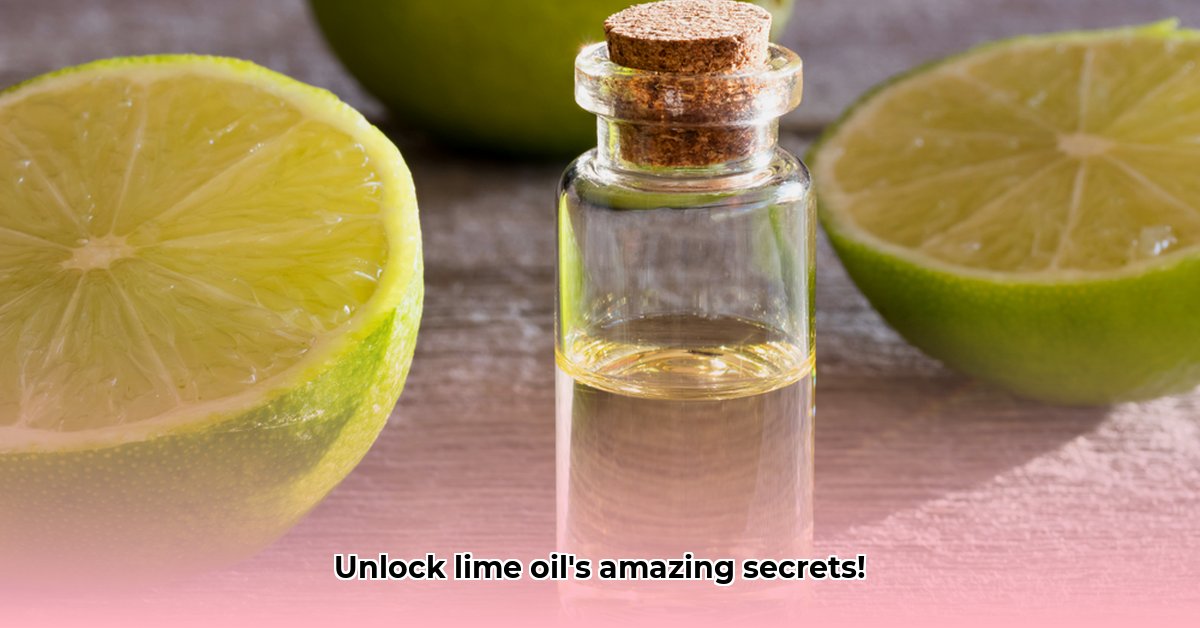
Lime essential oil, derived from the Citrus aurantifolia plant, offers a range of potential benefits, but understanding the scientific evidence is key. This review explores both the established and the still-under-investigation uses for this zesty oil.
Benefits of Lime Essential Oil: Separating Fact from Fiction
Lime essential oil has gained popularity for its potential health applications, but not all claims are equally supported by research. Let's examine the evidence:
Antimicrobial Properties: A Promising Start
Studies suggest that lime essential oil possesses antimicrobial properties, potentially effective against certain bacteria like E. coli and Staphylococcus aureus. This activity is often attributed to limonene, a major component known for its antibacterial effects. However, more large-scale human trials are needed to solidify these findings. "While in vitro studies are encouraging, we need more robust clinical evidence before we can definitively say how effective lime essential oil is against bacterial infections in humans," explains Dr. Anya Sharma, PhD, Microbiology, University of California, Berkeley.
Astringent Effects: Traditional Uses and Modern Research
Lime essential oil also exhibits astringent properties, potentially aiding in tissue tightening and minor wound healing. This traditional use, often associated with its ability to constrict blood vessels, requires further scientific investigation. Dr. David Lee, MD, Dermatology, Stanford University Medical Center cautions, "While anecdotally, astringent effects have been observed, rigorous clinical trials are necessary to validate these benefits."
Weight Loss and Antiviral Activity: Claims Needing Further Research
Claims suggesting lime essential oil's efficacy in weight loss or fighting viral infections are largely unsubstantiated. While some preliminary studies hint at a possible connection with weight management, these are far from conclusive. Similarly, evidence supporting antiviral properties remains sparse and mostly based on anecdotal accounts. "It's crucial to avoid unsubstantiated claims," emphasizes Dr. Emily Carter, RN, PhD, Integrative Medicine, Harvard Medical School. "Focusing on proven benefits and acknowledging limitations are essential for responsible use."
How to Safely Use Lime Essential Oil: A Practical Guide
Safe and effective use of lime essential oil is paramount. Follow these steps:
Dilute Before Application: Never apply undiluted essential oil directly to the skin. Always dilute it with a carrier oil (e.g., jojoba, coconut, almond) at a concentration of 1-3% (3 drops of essential oil per 1 teaspoon of carrier oil).
Perform a Patch Test: Before widespread use, conduct a patch test on a small, inconspicuous area of skin to check for allergic reactions. Monitor for 24 hours for any redness, itching, or irritation. Discontinue use if any adverse effects occur.
Sun Sensitivity Awareness: Lime essential oil can increase your skin's photosensitivity, increasing the risk of sunburn. Avoid unnecessary sun exposure for several hours following application.
Consult a Healthcare Professional: Lime essential oil isn't a substitute for medical treatment. For serious health conditions, consult a healthcare professional for the appropriate diagnosis and treatment. Use essential oils as a complementary therapy, not a replacement for professional medical care.
Choosing and Sourcing High-Quality Lime Essential Oil
Selecting high-quality lime essential oil is critical for both efficacy and safety. Look for reputable brands that provide third-party testing for purity and quality. Look for certifications such as USDA Organic to ensure quality and purity. Prefer oils extracted using cold-pressed or steam distillation methods. Always check the label for detailed information regarding the origin of the lime and extraction procedures. Avoid products with added synthetic fragrances or chemicals.
Key Takeaways: A Balanced Perspective on Lime Essential Oil
Lime essential oil demonstrates potential antimicrobial and astringent properties. However, more research, particularly large-scale human trials, is necessary.
Claims regarding weight loss and antiviral efficacy remain largely unsubstantiated.
Always dilute lime essential oil before applying it to the skin, perform a patch test, and avoid sun exposure afterward.
Prioritize high-quality oils from reputable suppliers and consult a healthcare professional before using it for any specific health concern.
Remember, while lime essential oil offers intriguing potential, responsible use and a balanced understanding of scientific evidence are paramount.